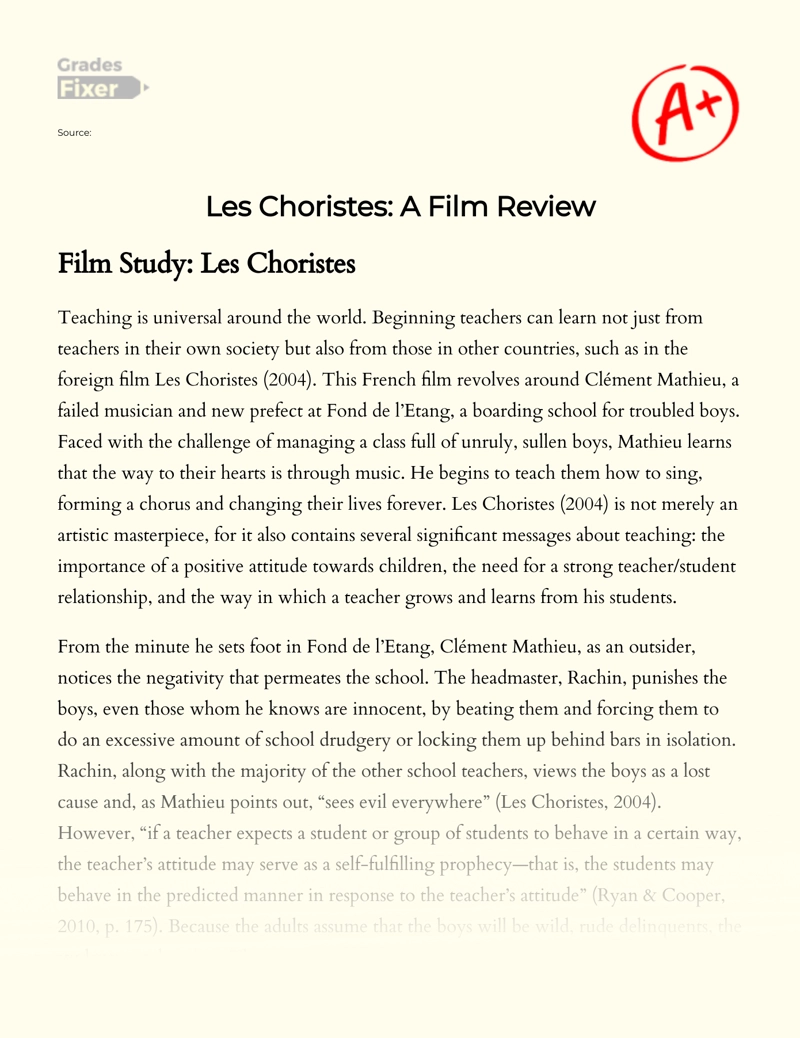
- Flashback
- Fade out
- Soundtrack
- Sound bridge
- Diegetic Sound
- Non-Diegetic Sound
- Montage
- Voice Over
- Les Choristes is based on another film La Cage aux rossignols(A Cage of Nightengales, 1945) and uses the same plot and names of characters. The original film was inspired by that of an actual educational centre, called Ker Goat, where Jacques Dietz, Roger and their team worked to help children in difficulty through choral singing and innovative teaching methods.
- The Chorus - Les Choristes 2004 free streaming. Fond de l'Etang is a boarding school for troubled boys located in the French countryside. The second we see the teddy-bear face of Clement Mathieu (Jugnot) as he arrives at a prison-like boarding school in 1949, we know where this is heading.
The Chorus - Les Choristes 2004 free streaming. Fond de l'Etang is a boarding school for troubled boys located in the French countryside. The second we see the teddy-bear face of Clement Mathieu (Jugnot) as he arrives at a prison-like boarding school in 1949, we know where this is heading.
Flashback:A flashback in film is when a scene from an earlier event is inter-cut with present events in the film. It is usually a memory of a character that relates to the back-story of that character or that character’s motivation. Sometimes films can have flashbacks in flashbacks..
Soundtrack: A soundtrack in a film is a separate track from the dialog and any sound effects in the film. Soundtracks are usually composed specifically for the films they are in. Like American Graffiti, this soundtrack plays with the ideas of diegetic and non-diegetic sound.
Diegetic sound: Any voice, musical passage, or sound effect presented as originating from a source within the film's world.
Non-Diegetic Sound: If the sound originates outside the film (as most background music/musical score/narration).
Sound Bridge: Sound bridges can lead in or out of a scene. They can occur at the beginning of one scene when the sound from the previous scene carries over briefly before the sound from the new scene begins. Alternatively, they can occur at the end of a scene, when the sound from the next scene is heard before the image appears on the screen.
Fade: An editing transition that dissolves from black or into black.

Voice-Over: The voice of an off-screen character or narrator that is heard by the audience.
A huge hit in its native France, period drama The Chorus sticks to a familiar songsheet: the one where a kindly teacher (slaphead musician Gerard Jugnot) slowly but very surely wins over his urchin pupils. Yet even though all the notes are predictable, the film hits them with wit, warmth and gusto. Centred on the soaring sound of a boys' choir, this Oscar nominee may be a school of schlock, but if you're willing to submit, it'll charm your ears and toast your cockles.
Les Choristes Movie
The second we see the teddy-bear face of Clement Mathieu (Jugnot) as he arrives at a prison-like boarding school in 1949, we know where this is heading. Soon enough, other well-worn types start to emerge: there's the cherubic orphan (Maxence Perrin), the bad apple (Gregory Gatignol) and the especially time-honoured Sulky Kid Who's Hiding A Phenomenal Talent (Jean-Baptiste Maunier's Morhange). And then, of course, there's the heartless headmaster (Francois Berleand), who believes in discipline but not reform and frowns upon our hero's every effort to inspire the kids.
'BOASTS A LIKEABLE SINCERITY'
Nonetheless, committed turns from all concerned bring a likeable sincerity to the sentiment-doused proceedings. Writer/director Christophe Barratier's nimble touch helps too, and he certainly doesn't waste his trump card: the Petits Chanteurs de Saint Marc choir, who supply the on-screen boys' angelic vocals. It's a shame that the climactic 'Oh captain, my captain' moment - here involving paper aeroplanes - doesn't pack quite the punch you expect. Still, by this point in the film, you'll be as won over as the little lads themselves.
The Chorus Les Choristes

Les Choristes Free
In French with English subtitles.